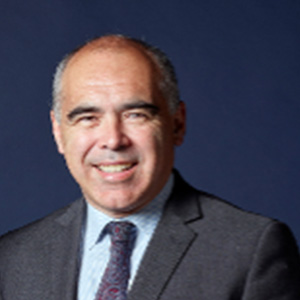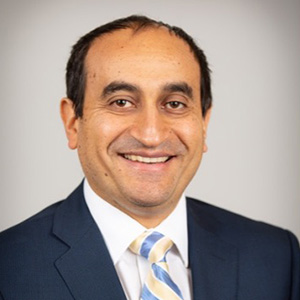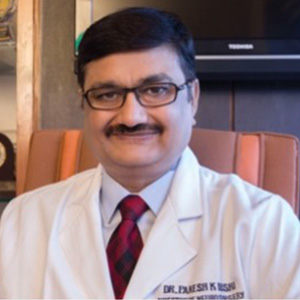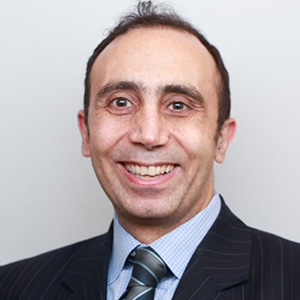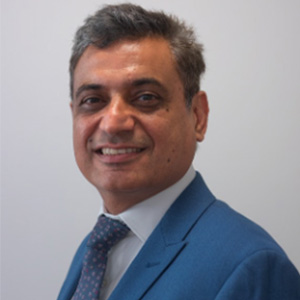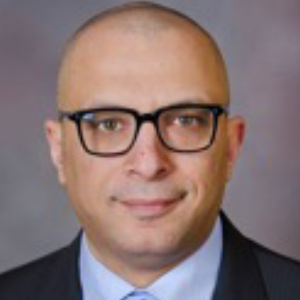The Postgraduate Certificate in Neuromodulation and Pain Management is designed to provide academic qualification and specialist skills with essential knowledge, with experienced speakers who are key global opinion leaders in this niche area. The syllabus encompasses pertinent anatomy, patho-physiology, and radiological assessment building towards clinical implications and suitable indications. The program provides a detailed understanding of available and emerging technology and programming strategies.
- Our online modular programme is designed to fit around your busy working life.
- Four modules per academic year
- Join our unique programme and gain specialist skills and understanding of this growing field that is reshaping the whole landscape of neuroscience
- Achieve a qualification in neuromodulation in one academic year through part-time study
Study options
- Starting in
- September 2025
- Location
- Distance Learning
- Fees
- Home: £4,300
Overseas: £6,300
EU/EEA/Swiss students
What you'll study
You’ll study modules on anatomy and pathophysiology of central and peripheral pain pathways. Through your studies, you will gain an understanding of the role of neuromodulation in pain including, post spinal pain syndrome type 1 and 2, intractable neuropathic pain, refractory angina, complex regional pain syndrome, diabetic neuropathy, headache and pelvic pain, and evaluate current evidence.
You will gain knowledge of current available and emerging technologies and be able to choose the appropriate therapy for specific indications. You will be able to evaluate current national guidance to identify appropriate patient selection. You will learn about the role of functional neurosurgery in pain including deep brain stimulation, its indications, and complications. You will gain knowledge of intra thecal therapy for cancer pain, and gain an insight into the procedural skills and long term management of patients.
The programme is designed for you if you are seeking deeper understanding and further insights into this field, including setting up neuromodulation service in treatment of chronic pain symptoms.
This certification program will enable you to build a foundation towards progressing hands-on fellowships and cadaver workshops
For further information about the programme, please contact enquiries@spinefoundation.org.uk
Structure
- October 24 -21, 22, 23 – Module 1
- November 24 - 25, 26, 27 – Module 2
- February 25 - 24, 25, 26 – Module 3
- March 25 - 24, 25, 26 – Module 4
The modular nature of the programme is designed to fit in with the needs of students in full-time employment. You will receive the taught element of the modules in three-day blocks approximately every four to six weeks.
To obtain a Postgraduate Certificate, you are required to complete 4 x 15 credit modules (60 credits).
All the modules are compulsory.
The following modules will be delivered in Semester 1:
- Anatomy- Neurophysiology of Neuromodulation
- Patient care and Procedurals skills
Semester 2 modules:
- Devices and available technology
- Intrathecal drug delivery for cancer and non cancer pain

Masters Open Event
Join us on-campus and find out what it’s like to study a masters degree at Queen Mary.
Register nowCompulsory/Core modules
Students will acquire the knowledge of neural anatomy, pain pathways including peripheral and central transmission relevant to neuromodulation, particularly the targets of stimulation; spinal and supraspinal neurons. Students will learn the emerging concepts of supra spinal mechanisms and closed loop in neuromodulation. Physics of waveform including concept and rationale of differential frequency, charge and neural dose will be discussed and students will be able to ascertain their clinical implications.
Students will gain knowledge of current clinical guidelines, consensus statements and referral criteria for patient selection. Students will understand the validated assessment tools and MDT based clinical/psychological assessments used for selection for neuromodulation procedures. Radiological assessment including review of MRI scans in context of surgical targets and usefulness of SCS following post-surgery scarring (PSPS type 2) or in absence of surgery (PSPS type 1) will be discussed. Students will be provided with knowledge to manage preoperative preparation, patient education and expectations. Surgical skills including percutaneous and surgical placement will be described. Students will learn intraoperative troubleshooting complication management and long-term care of the patients.
Students will gain knowledge and be able to compare and contrast the hardware of available devices including current leads, implantable pulse generators, primary cell and rechargeable technologies for neuromodulation. Students will gain knowledge about the software platforms and be able to compare and contrast the programming capabilities of available devices. Students will gain understanding of deep brain stimulation, its role and indications including movement disorders, parkinsonism and epilepsy.
Students will gain knowledge of ethical challenges, current clinical guidelines and consensus statements for safe delivery of intrathecal therapy for cancer and non-cancer pain. Students will gain knowledge on setting up an intrathecal service and working in conjunction with allied specialities. Students will gain the knowledge on pharmacotherapy for intra-thecal drug delivery and be able to compare and contrast the role of opioid and non-opioid medications. Surgical skills including percutaneous and surgical placement of intrathecal delivery systems will be described. Students will learn intra operative troubleshooting, complication management and long-term care of the patients.
- October 24 -21, 22, 23 – Module 1
- November 24 - 25, 26, 27 – Module 2
- February 25 - 24, 25, 26 – Module 3
- March 25 - 24, 25, 26 – Module 4
Assessment
- 100% Modules
- %
You will be assessed based on (online) submitted written assignments.
Teaching
You will experience a variety of online teaching and learning methods including lectures and seminars, guided reading exercises, and various activities incorporating individual and group work which will help you to consolidate your learning.
Programme leads
Dr Kavita Poply, Dr Vivek Mehta
Programme faculty
Alaa Abd-Elsayed, Ganesan Baranidharan, Stana Bojainic, Paresh Doshi, Preeti Doshi, Sam Eldabe, James Fitzgerald, Babita Ghai, Chris Gilligan, Ashish Gulve, Salim Hayek, Frank Huygen, Jan willem Kallewaard, Serge Nikolic, Lawrence Poree, Philippe Rigoard, Marc Russo.
Where you'll learn
Facilities
- The William Harvey Research Institute offers state-of-the-art core facilities, including a Genome Centre, a flow cytometry and cell sorting station, and in vivo imaging facilities
- Access to a flexible online e-learning platform (QMPlus) which allows you to discuss and exchange ideas, share knowledge as well as access all lecture sessions in your own time
- Access to video and audio recordings of all lectures and other online resources
- Access to online library facilities and reading materials (journals, books and databases)
- Access to our campus facilities if you decide to visit at any point during your course
- Watch our video to discover online study at Queen Mary
About the Institute
William Harvey Research Institute
The William Harvey Research Institute (WHRI) places a high value upon training the next generation of researchers. We are part of the Faculty of Medicine and Dentistry at Queen Mary University of London, which is ranked joint seventh in the UK for the quality of our research (REF 2021).
Our primary research focus and excellence lies in our cardiovascular, inflammation and endocrine research themes. In addition, we achieve international excellence in critical care and perioperative medicine research. We aim to combine talents from different disciplines such as genomics, cell biology, and pharmacology, with translational bench-to-patient studies and large-scale clinical trials.
We are currently the largest pharmacological research institute in the UK University sector, and one of the largest in Europe. The Centre employs 530 clinicians and scientists from 45 countries.
Career paths
During your studies you'll have access to support at every stage in your degree, including one-to-one academic guidance, tailored workshops and external guest speakers. Graduates of this course are well-placed to progress onto MSc-level study.
Graduates of this programme will be well placed to develop their careers in the rapidly developing market in Neuromodulation.
- 93% of William Harvey Research Institute (WHRI) postgraduate-taught graduates are in employment or further study (2020/21)
- 88% of WHRI graduates in employment or study are in highly skilled work or graduate study (2020/21)
Fees and funding
Funding
There are a number of ways you can fund your postgraduate degree.
- Scholarships and bursaries
- Postgraduate loans (UK students)
- Country-specific scholarships for international students
Our Advice and Counselling service offers specialist support on financial issues, which you can access as soon as you apply for a place at Queen Mary. Before you apply, you can access our funding guides and advice on managing your money:
Entry requirements
UK
Degree requirements
A 2:2 or above at undergraduate level in a related subject such as Medicine, Nursing, Physiotherapy from a recognised academic institution.
Additional information
Applicants who do not meet the academic requirements but have substantial experience working as allied health professionals such as Paramedics, Physiotherapists, Osteopaths etc will be considered on an individual basis only.
Find out more about how to apply for our postgraduate taught courses.
International
Afghanistan
We normally consider the following qualifications for entry to our postgraduate taught programmes: Master Degree from a recognised institution.
UK 1st class degree: 90%; or GPA 3.7 out of 4.0
UK 2:1 degree: 80%; or GPA 3.0 out of 4.0
UK 2:2 degree: 70%; or GPA 2.4 out of 4.0
Albania
We normally consider the following qualifications for entry to our postgraduate taught programmes: Bachelor Degree from a recognised institution.
UK 1st class degree: 9.5 out of 10
UK 2:1 degree: 8 out of 10
UK 2:2 degree: 7 out of 10
Algeria
We normally consider the following qualifications for entry to our postgraduate taught programmes: Licence; Diplome de [subject area]; Diplome d'Etudes Superieures; Diplome de Docteur end Pharmacie; or Diplome de Docteur en Medecine from a recognised institution.
UK 1st class degree: 16 out of 20
UK 2:1 degree: 14 out of 20
UK 2:2 degree: 12 out of 20
Angola
We normally consider the following qualifications for entry to our postgraduate taught programmes: Grau de Licenciado/a (minimum 4 years) from selected institutions.
UK 1st class degree: 17 out of 20
UK 2:1 degree: 15 out of 20
UK 2:2 degree: 13 out of 20
Argentina
We normally consider the following qualifications for entry to our postgraduate taught programmes: Titulo/ Grado de Licenciado/ Titulo de [subject area] (minimum 4 years) from a recognised institution.
UK 1st class degree: 9 out of 10
UK 2:1 degree: 7.5 out of 10
UK 2:2 degree: 6.5 out of 10
Armenia
We normally consider the following qualifications for entry to our postgraduate taught programmes: Bachelor Degree or Specialist Diploma from a recognised institution.
UK 1st class degree: 87 out of 100
UK 2:1 degree: 75 out of 100
UK 2:2 degree: 61 out of 100
Australia
We normally consider the following qualifications for entry to our postgraduate taught programmes: Bachelor Degree (minimum 3 years) or Bachelor Honours degree from a recognised institution.
UK 1st class degree: High Distinction; or First Class with Honours
UK 2:1 degree: Distinction; or Upper Second Class with Honours
UK 2:2 degree: Credit; or Lower Second Class with Honours
Austria
We normally consider the following qualifications for entry to our postgraduate taught programmes: Bachelor Degree from a recognised institution.
UK 1st class degree: 1.5 out of 5.0
UK 2:1 degree: 2.5 out of 5.0
UK 2:2 degree: 3.5 out of 5.0
The above relates to grading scale where 1 is the highest and 5 is the lowest.
Azerbaijan
We normally consider the following qualifications for entry to our postgraduate taught programmes: Bachelor Degree or Specialist Diploma from a recognised institution.
UK 1st class degree: 90%; or GPA 4.7 out of 5
UK 2:1 degree: 80%; or GPA 4 out of 5
UK 2:2 degree: 70%; or GPA 3.5 out of 5
Bahamas
We normally consider the following qualifications for entry to our postgraduate taught programmes: Bachelor Degree (minimum 3 years) from the University of West Indies.
UK 1st class degree: First Class Honours
UK 2:1 degree: Upper Second Class Honours
UK 2:2 degree: Lower Second Class Honours
Bahrain
We normally consider the following qualifications for entry to our postgraduate taught programmes: Bachelor Degree from a recognised institution.
UK 1st class degree: GPA 3.7 out of 4.0; or 90 out of 100
UK 2:1 degree: GPA 3.0 out of 4.0; or 80 out of 100
UK 2:2 degree: GPA 2.3 out of 4.0; or 74 out of 100
Bangladesh
We normally consider the following qualifications for entry to our postgraduate taught programmes: Bachelor Degree (minimum 4 years) from selected institutions.
UK 1st class degree: GPA 3.2 to 3.7 out of 4.0
UK 2:1 degree: GPA 3.0 to 3.3 out of 4.0
UK 2:2 degree: GPA 2.3 to 2.7 out of 4.0
Offer conditions will vary depending on the institution you are applying from. For some institutions/degrees we will ask for different grades to above, so this is only a guide.
Barbados
We normally consider the following qualifications for entry to our postgraduate taught programmes: Bachelor Degree from the University of West Indies, Cave Hill or Barbados Community College.
UK 1st class degree: First Class Honours*; or GPA 3.7 out of 4.0**
UK 2:1 degree: Upper Second Class Honours*; or GPA 3.0 out of 4.0**
UK 2:2 degree: Lower Second Class Honours*; or GPA 2.4 out of 4.0**
*relates to: the University of West Indies, Cave Hill.
**relates to: Barbados Community College.
Belarus
We normally consider the following qualifications for entry to our postgraduate taught programmes: Bachelor Degree or Specialist Diploma (minimum 4 years) from a recognised institution.
UK 1st class degree: 9 out of 10; or 4.7 out of 5
UK 2:1 degree: 7 out of 10; or 4 out of 5
UK 2:2 degree: 5 out of 10; or 3.5 out of 5
Belgium
We normally consider the following qualifications for entry to our postgraduate taught programmes: Bachelor Degree (180 ECTS credits) from a recognised institution.
UK 1st class degree: 80% or 16/20*; or 78%**
UK 2:1 degree: 70% or 14/20*; or 72%**
UK 2:2 degree: 60% or 12/20*; or 65%**
*Flanders (Dutch-speaking)/ Wallonia (French-speaking)
**German-speaking
Belize
We normally consider the following qualifications for entry to our postgraduate taught programmes: Bachelor Degree (minimum 3 years) from the University of West Indies.
UK 1st class degree: First Class Honours
UK 2:1 degree: Upper Second Class Honours
UK 2:2 degree: Lower Second Class Honours
Benin
We normally consider the following qualifications for entry to our postgraduate taught programmes: Maitrise or Masters from a recognised institution.
UK 1st class degree: 16 out of 20
UK 2:1 degree: 14 out of 20
UK 2:2 degree: 12 out of 20
Bolivia
We normally consider the following qualifications for entry to our postgraduate taught programmes: Titulo de Bachiller Universitario or Licenciado / Titulo de [subject area] (minimum 4 years) from a recognised institution.
UK 1st class degree: 85%* or 80%**
UK 2:1 degree: 75%* or 70%**
UK 2:2 degree: 65%* or 60%**
*relates to: Titulo de Bachiller Universitario
**relates to: Licenciado / Titulo de [subject area]
Bosnia and Herzegovina
We normally consider the following qualifications for entry to our postgraduate taught programmes: Bachelor Degree (minimum 3 years) from a recognised institution.
UK 1st class degree: 9.5 out of 10
UK 2:1 degree: 8.5 out of 10
UK 2:2 degree: 7.5 out of 10
Botswana
We normally consider the following qualifications for entry to our postgraduate taught programmes: Bachelor Degree (minimum 5 years) or Master Degree from the University of Botswana.
UK 1st class degree: 80%
UK 2:1 degree: 70%
UK 2:2 degree: 60%
Brazil
We normally consider the following qualifications for entry to our postgraduate taught programmes: Título de Bacharel / Título de [subject area] or Título de Licenciado/a (minimum 4 years) from a recognised institution.
UK 1st class degree: 8.25 out of 10
UK 2:1 degree: 7.5 out of 10
UK 2:2 degree: 6.5 out of 10
The above grades assumes that the grading scale has a pass mark of 5.
Brunei
We normally consider the following qualifications for entry to our postgraduate taught programmes: Bachelor Honours degree from a recognised institution.
UK 1st class degree: First Class Honours
UK 2:1 degree: Upper Second Class Honours
UK 2:2 degree: Lower Second Class Honours
Bulgaria
We normally consider the following qualifications for entry to our postgraduate taught programmes: Bachelor Degree from a recognised institution.
UK 1st class degree: 5.75 out of 6.0
UK 2:1 degree: 4.75 out of 6.0
UK 2:2 degree: 4.0 out of 6.0
Burundi
We normally consider the following qualifications for entry to our postgraduate taught programmes: Diplome d'Etudes Approfondies from a recognised institution.
UK 1st class degree: 85%; or 16 out of 20
UK 2:1 degree: 75%; or 14 out of 20
UK 2:2 degree: 60%; or 12 out of 20
Cambodia
We normally consider the following qualifications for entry to our postgraduate taught programmes: Masters Degree from a recognised institution.
UK 1st class degree: 80%; or GPA 3.5 out of 4.0
UK 2:1 degree: 70%; or GPA 3.0 out of 4.0
UK 2:2 degree: 60%; or GPA 2.35 out of 4.0
Cameroon
We normally consider the following qualifications for entry to our postgraduate taught programmes: Bachelor Degree; Licence; Diplome d'Etudes Superieures de Commerce; Diplome d'Ingenieur de Conception/ Travaux; Doctorat en Medecine/ Pharmacie; or Maitrise or Master 1 from selected institutions.
UK 1st class degree: 16 out of 20; or GPA 3.6 out of 4.0
UK 2:1 degree: 14 out of 20; or GPA 3.0 out of 4.0
UK 2:2 degree: 12 out of 20; or GPA 2.5 out of 4.0
Canada
We normally consider the following qualifications for entry to our postgraduate taught programmes: Bachelor Degree or Bachelor Honours Degree from a recognised institution.
UK 1st class degree: GPA 3.6 out of 4.0
UK 2:1 degree: GPA 3.2 out of 4.0
UK 2:2 degree: GPA 2.5 out of 4.0
Chile
We normally consider the following qualifications for entry to our postgraduate taught programmes: Grado de Licenciado en [subject area] or Titulo (Professional) de [subject area] (minimum 4 years) from a recognised institution.
UK 1st class degree: 6.5 out of 7
UK 2:1 degree: 5.5 out of 7
UK 2:2 degree: 5 out of 7
China
We normally consider the following qualifications for entry to our postgraduate taught programmes: Bachelor Degree (minimum 4 years) from selected institutions.
UK 1st class degree: 85 to 95%
UK 2:1 degree: 75 to 85%
UK 2:2 degree: 70 to 80%
Offer conditions will vary depending on the institution you are applying from.
Colombia
We normally consider the following qualifications for entry to our postgraduate taught programmes: Licenciado en [subject area] or Titulo de [subject area] (minimum 4 years) from a recognised institution.
UK 1st class degree: 4.60 out of 5.00
UK 2:1 degree: 4.00 out of 5.00
UK 2:2 degree: 3.50 out of 5.00
Congo, Dem. Rep. of
We normally consider the following qualifications for entry to our postgraduate taught programmes: Diplome d'Etudes Approfondies or Diplome d'Etudes Speciales from a recognised institution.
UK 1st class degree: 16 out of 20; or 90%
UK 2:1 degree: 14 out of 20; or 80%
UK 2:2 degree: 12 out of 20; or 70%
Congo, Rep. of
We normally consider the following qualifications for entry to our postgraduate taught programmes: Diplome d'Etudes Superieures or Maitrise from a recognised institution.
UK 1st class degree: 16 out of 20
UK 2:1 degree: 14 out of 20
UK 2:2 degree: 12 out of 20
Costa Rica
We normally consider the following qualifications for entry to our postgraduate taught programmes: Bachiller or Licenciado from a recognised institution.
UK 1st class degree: 9 out of 10
UK 2:1 degree: 8 out of 10
UK 2:2 degree: 7.5 out of 10
Croatia
We normally consider the following qualifications for entry to our postgraduate taught programmes: Bachelor Degree or Advanced Diploma of Higher Education Level VII/1 (Diploma - Visoko obrazovanje) from a recognised institution.
UK 1st class degree: 4.5 out of 5
UK 2:1 degree: 4 out of 5
UK 2:2 degree: 3 out of 5
Cuba
We normally consider the following qualifications for entry to our postgraduate taught programmes: Titulo de Licenciado/ Arquitecto/ Doctor/ Ingeniero from a recognised institution.
UK 1st class degree: 4.7 out of 5
UK 2:1 degree: 4 out of 5
UK 2:2 degree: 3.5 out of 5
Cyprus
We normally consider the following qualifications for entry to our postgraduate taught programmes: Bachelor Degree from a recognised institution.
UK 1st class degree: 8 out of 10; or GPA 3.7 out of 4.0
UK 2:1 degree: 7.0 out of 10; or GPA 3.0 out of 4.0
UK 2:2 degree: 6.0 out of 10; or GPA 2.5 out of 4.0
Czech Republic
We normally consider the following qualifications for entry to our postgraduate taught programmes: Bachelor Degree (180 ECTS credits) from a recognised institution.
UK 1st class degree: 1.2 out of 4
UK 2:1 degree: 1.5 out of 4
UK 2:2 degree: 2.5 out of 4
The above relates to grading scale where 1 is the highest and 4 is the lowest.
Denmark
We normally consider the following qualifications for entry to our postgraduate taught programmes: Bachelor degree from a recognised institution.
UK 1st class degree: 12 out of 12 (2007 onwards); or 11 out of 13 (before 2007)
UK 2:1 degree: 7 out of 12 (2007 onwards); or 8 out of 13 (before 2007)
UK 2:2 degree: 4 out of 12 (2007 onwards); or 7 out of 13 (before 2007)
Dominican Republic
We normally consider the following qualifications for entry to our postgraduate taught programmes: Licenciado/ Titulo de [subject area] (minimum 4 years) from a recognised institution.
UK 1st class degree: 95/100
UK 2:1 degree: 85/100
UK 2:2 degree: 78/100
Ecuador
We normally consider the following qualifications for entry to our postgraduate taught programmes: Titulo de Licenciado / Titulo de [subject area] (minimum 4 years) from a recognised institution.
UK 1st class degree: 90%; or 9/10; or 19/20; or GPA 3.7 out of 4.0
UK 2:1 degree: 80%; or 8/10; or 18/20; or GPA 3.0 out of 4.0
UK 2:2 degree: 70%; or 7/10; or 14/20; or GPA 2.4 out of 4.0
Egypt
We normally consider the following qualifications for entry to our postgraduate taught programmes: Bachelor Degree from selected institutions.
UK 1st class degree: 85%; or GPA 3.7 out of 4
UK 2:1 degree: 75%; or GPA 3.0 out of 4
UK 2:2 degree: 65%; or GPA 2.5 out of 4
El Salvador
We normally consider the following qualifications for entry to our postgraduate taught programmes: Licenciado/ Titulo de [subject area] (minimum 5 years) from a recognised institution.
UK 1st class degree: 8.5 out of 10
UK 2:1 degree: 7.5 out of 10
UK 2:2 degree: 6.5 out of 10
Eritrea
We normally consider the following qualifications for entry to our postgraduate taught programmes: Masters Degree from a recognised institution.
UK 1st class degree: GPA 3.7 out of 4.0
UK 2:1 degree: GPA 3.0 out of 4.0
UK 2:2 degree: GPA 2.4 out of 4.0
Estonia
We normally consider the following qualifications for entry to our postgraduate taught programmes: Bachelor Degree; University Specialist's Diploma; or Professional Higher Education Diploma from a recognised institution.
UK 1st class degree: 4.5 out of 5
UK 2:1 degree: 3.5 out of 5
UK 2:2 degree: 2 out of 5
The above grades assumes that 1 is the pass mark.
Eswatini
We normally consider the following qualifications for entry to our postgraduate taught programmes: Masters Degree from a recognised institution.
UK 1st class degree: 80%
UK 2:1 degree: 70%
UK 2:2 degree: 60%
Ethiopia
We normally consider the following qualifications for entry to our postgraduate taught programmes: Masters Degree from a recognised institution.
UK 1st class degree: GPA 3.7 out of 4.0
UK 2:1 degree: GPA 3.0 out of 4.0
UK 2:2 degree: GPA 2.5 out of 4.0
Fiji
We normally consider the following qualifications for entry to our postgraduate taught programmes: Bachelor Degree (minimum 3 years) from one of the following institutions: Fiji National University, the University of Fiji, or the University of South Pacific, Fiji.
UK 1st class degree: GPA 4.0 out of 5.0*; or overall grade A with High Distinction pass**; or GPA 4.0 out of 4.5***
UK 2:1 degree: GPA 3.33 out of 5.0*; or overall grade B with Credit pass**; or GPA 3.5 out of 4.5***
UK 2:2 degree: GPA 2.33 out of 5.0*; or overall grade S (Satisfactory)**; or GPA 2.5 out of 4.5***
*relates to Fiji National University
**relate to the University of Fiji
***relates to the University of South Pacific, Fiji
Finland
We normally consider the following qualifications for entry to our postgraduate taught programmes: Bachelor Degree/ Kandidaatti/ Kandidat (minimum 180 ECTS credits) from a recognised institution; or Bachelor degree (Ammattikorkeakoulututkinto/ Yrkeshögskoleexamen) from a recognised University of Applied Sciences.
UK 1st class degree: 4.5 out of 5; or 2.8 out of 3
UK 2:1 degree: 3.5 out of 5; or 2 out of 3
UK 2:2 degree: 2.5 out of 5; or 1.4 out of 3
France
We normally consider the following qualifications for entry to our postgraduate taught programmes: Licence; Grade de Licence; Diplome d'Ingenieur; or Maitrise from a recognised institution.
UK 1st class degree: 14 out of 20
UK 2:1 degree: 12 out of 20
UK 2:2 degree: 11 out of 20
Gambia
We normally consider the following qualifications for entry to our postgraduate taught programmes: Masters Degree from a recognised institution.
UK 1st class degree: 80%; or GPA 4.0 out of 4.3
UK 2:1 degree: 67%; or GPA 3.3 out of 4.3
UK 2:2 degree: 60%; or GPA 2.7 out of 4.3
Georgia
We normally consider the following qualifications for entry to our postgraduate taught programmes: Bachelor Degree or Specialist Diploma (minimum 4 years) from a recognised institution.
UK 1st class degree: 91 out of 100; or 4.7 out of 5
UK 2:1 degree: 81 out of 100; or 4 out of 5
UK 2:2 degree: 71 out of 100; or 3.5 out of 5
Germany
We normally consider the following qualifications for entry to our postgraduate taught programmes: Bachelor Degree (180 ECTS credits) from a recognised institution.
UK 1st class degree: 1.5 out of 5.0
UK 2:1 degree: 2.5 out of 5.0
UK 2:2 degree: 3.5 out of 5.0
The above relates to grading scale where 1 is the highest and 5 is the lowest.
Ghana
We normally consider the following qualifications for entry to our postgraduate taught programmes: Bachelor Degree from a recognised institution.
UK 1st class degree: First Class
UK 2:1 degree: Second Class (Upper Division)
UK 2:2 degree: Second Class (Lower Division)
Greece
We normally consider the following qualifications for entry to our postgraduate taught programmes: Degrees from recognised selected institutions in the University sector or Degrees (awarded after 2003) from recognised Technological Educational Institutes.
UK 1st class degree: 8 out of 10*; or 9 out of 10**
UK 2:1 degree: 7 out of 10*; or 7.5 out of 10**
UK 2:2 degree: 6 out of 10*; or 6.8 out of 10**
*Relates to degrees from the University Sector.
**Relates to degrees from Technological Educational Institutes.
Grenada
We normally consider the following qualifications for entry to our postgraduate taught programmes: Bachelor Degree (minimum 3 years) from the University of West Indies.
UK 1st class degree: First Class Honours
UK 2:1 degree: Upper Second Class Honours
UK 2:2 degree: Lower Second Class Honours
Guatemala
We normally consider the following qualifications for entry to our postgraduate taught programmes: Licenciado / Titulo de [subject area] (minimum 4 years) from a recognised institution.
UK 1st class degree: 90%
UK 2:1 degree: 80%
UK 2:2 degree: 70%
The above grades assumes that the pass mark is 61% or less.
Guinea
We normally consider the following qualifications for entry to our postgraduate taught programmes: Master; Maitrise; Diplome d'Etudes Superieures; or Diplome d'Etudes Approfondies from a recognised institution.
UK 1st class degree: 16 out of 20
UK 2:1 degree: 14 out of 20
UK 2:2 degree: 12 out of 20
Guyana
We normally consider the following qualifications for entry to our postgraduate taught programmes: Graduate Diploma (Postgraduate) or Masters degree from a recognised institution.
UK 1st class degree: GPA 3.7 out of 4.0
UK 2:1 degree: GPA 3.0 out of 4.0
UK 2:2 degree: GPA 2.4 out of 4.0
Honduras
We normally consider the following qualifications for entry to our postgraduate taught programmes: Titulo de Licenciado/a / Grado Academico de Licenciatura (minimum 4 years) from a recognised institution.
UK 1st class degree: 90%; or 4.7 out of 5; or GPA 3.7 out of 4.0
UK 2:1 degree: 80%; or 4.0 out of 5; or GPA 3.0 out of 4.0
UK 2:2 degree: 70%; or 3.5 out of 5; or GPA 2.4 out of 4.0
Hong Kong
We normally consider the following qualifications for entry to our postgraduate taught programmes: Bachelor Honours Degree from selected institutions.
UK 1st class degree: First Class Honours
UK 2:1 degree: Upper Second Class Honours
UK 2:2 degree: Lower Second Class Honours
Hungary
We normally consider the following qualifications for entry to our postgraduate taught programmes: Bachelor degree (Alapfokozat) or University Diploma (Egyetemi Oklevel) from a recognised institution.
UK 1st class degree: 4.75 out of 5
UK 2:1 degree: 4 out of 5
UK 2:2 degree: 3.5 out of 5
Iceland
We normally consider the following qualifications for entry to our postgraduate taught programmes: Bachelor degree (Baccalaureus or Bakkalarprof) from a recognised institution.
UK 1st class degree: 8.25 out of 10
UK 2:1 degree: 7.25 out of 10
UK 2:2 degree: 6.5 out of 10
India
We normally consider the following qualifications for entry to our postgraduate taught programmes: Bachelor Degree (minimum 3 years) from selected institutions.
UK 1st class degree: 75% to 80%
UK 2:1 degree: 60% to 70%
UK 2:2 degree: 50% to 60%
Offer conditions will vary depending on the institution you are applying from. For some institutions/degrees we will ask for different grades to above, so this is only a guide.
For India, offers may be made on the GPA scale.
We do not consider the Bachelor of Vocation (B. Voc.) for Masters entry.
Indonesia
We normally consider the following qualifications for entry to our postgraduate taught programmes: Sarjna I (S1) Bachelor Degree or Diploma IV (D4) (minimum 4 years) from selected degree programmes and institutions.
UK 1st class degree: GPA 3.6 to 3.8 out of 4.0
UK 2:1 degree: GPA 3.0 to 3.2 out of 4.0
UK 2:2 degree: GPA 2.67 to 2.8 out of 4.0
Offer conditions will vary depending on the institution you are applying from and the degree that you study.
Iran
We normally consider the following qualifications for entry to our postgraduate taught programmes: Bachelor Degree from a recognised institution.
UK 1st class degree: 17.5 to 18.5 out of 20
UK 2:1 degree: 15 to 16 out of 20
UK 2:2 degree: 13.5 to 14 out of 20
Offer conditions will vary depending on the institution you are applying from.
Iraq
We normally consider the following qualifications for entry to our postgraduate taught programmes: Bachelor Degree (minimum 4 years) from a recognised institution.
UK 1st class degree: 85 out of 100
UK 2:1 degree: 75 out of 100
UK 2:2 degree: 60 out of 100
Ireland
We normally consider the following qualifications for entry to our postgraduate taught programmes: Honours Bachelor Degree from a recognised institution.
UK 1st class degree: First Class Honours
UK 2:1 degree: Second Class Honours Grade I
UK 2:2 degree: Second Class Honours Grade II
Israel
We normally consider the following qualifications for entry to our postgraduate taught programmes: Bachelor Degree from a recognised institution.
UK 1st class degree: 90%
UK 2:1 degree: 80%
UK 2:2 degree: 65%
Italy
We normally consider the following qualifications for entry to our postgraduate taught programmes: Laurea (180 ECTS credits) from a recognised institution.
UK 1st class degree: 110 out of 110
UK 2:1 degree: 105 out of 110
UK 2:2 degree: 94 out of 110
Cote D’ivoire (Ivory Coast)
We normally consider the following qualifications for entry to our postgraduate taught programmes: Diplome d'Ingenieur; Doctorat en Medicine; Maitrise; Master; Diplome d'Etudes Approfondies; or Diplome d'Etudes Superieures Specialisees from selected institutions.
UK 1st class degree: 16 out of 20
UK 2:1 degree: 14 out of 20
UK 2:2 degree: 12 out of 20
Jamaica
We normally consider the following qualifications for entry to our postgraduate taught programmes: Bachelor Degree (minimum 3 years) from the University of West Indies (UWI) or a recognised institution.
UK 1st class degree: GPA 3.7 out of 4.0; or First Class Honours from the UWI
UK 2:1 degree: GPA 3.0 out of 4.0; or Upper Second Class Honours from the UWI
UK 2:2 degree: GPA 2.4 out of 4.0; or Lower Second Class Honours from the UWI
Japan
We normally consider the following qualifications for entry to our postgraduate taught programmes: Bachelor Degree from selected institutions.
UK 1st class degree: S overall* or A overall**; or 90%; or GPA 3.70 out of 4.00
UK 2:1 degree: A overall* or B overall**; or 80%; or GPA 3.00 out of 4.00
UK 2:2 degree: B overall* or C overall**; or 70%; or GPA 2.3 out of 4.00
*Overall mark is from the grading scale: S, A, B, C (S is highest mark)
**Overall mark is from the grading scale: A, B, C, D (A is highest mark)
Jordan
We normally consider the following qualifications for entry to our postgraduate taught programmes: Bachelor Degree from a recognised institution.
UK 1st class degree: 85%; or GPA of 3.7 out of 4.0
UK 2:1 degree: 75%; or GPA of 3.0 out of 4.0
UK 2:2 degree: 70%; or GPA of 2.5 out of 4.0
Kazakhstan
We normally consider the following qualifications for entry to our postgraduate taught programmes: Bachelor Degree or Specialist Diploma from a recognised institution.
UK 1st class degree: 3.8 out of 4.0/4.33; or 4.7 out of 5
UK 2:1 degree: 3.33 out of 4.0/4.33; or 4.0 out of 5
UK 2:2 degree: 2.67 out of 4.0/4.33; or 3.5 out of 5
Kenya
We normally consider the following qualifications for entry to our postgraduate taught programmes: Bachelor Degree (minimum 4 years) from a recognised institution.
UK 1st class degree: First Class Honours; or GPA 3.6 out of 4.0
UK 2:1 degree: Second Class Honours Upper Division; or GPA 3.0 out of 4.0
UK 2:2 degree: Second Class Honours Lower Division; or GPA 2.4 out of 4.0
Kosovo
We normally consider the following qualifications for entry to our postgraduate taught programmes: Bachelor Degree from a recognised institution.
UK 1st class degree: 9.5 out of 10
UK 2:1 degree: 8.5 out of 10
UK 2:2 degree: 7.5 out of 10
Kuwait
We normally consider the following qualifications for entry to our postgraduate taught programmes: Bachelor Degree from a recognised institution.
UK 1st class degree: GPA 3.67 out of 4.0
UK 2:1 degree: GPA 3.0 out of 4.0
UK 2:2 degree: GPA 2.67 out of 4.0
Kyrgyzstan
We normally consider the following qualifications for entry to our postgraduate taught programmes: Bachelor Degree or Specialist Diploma (minimum 4 years) from a recognised institution.
UK 1st class degree: 4.7 out of 5; or GPA 3.7 out of 4
UK 2:1 degree: 4.0 out of 5; or GPA 3.0 out of 4
UK 2:2 degree: 3.5 out of 5; or GPA 2.4 out of 4
Laos
We normally consider the following qualifications for entry to our postgraduate taught programmes: Masters Degree from a recognised institution.
UK 1st class degree: GPA 3.7 out of 4.0
UK 2:1 degree: GPA 3.0 out of 4.0
UK 2:2 degree: GPA 2.4 out of 4.0
Latvia
We normally consider the following qualifications for entry to our postgraduate taught programmes: Bachelor Degree (awarded after 2002) from a recognised institution.
UK 1st class degree: 9.5 out of 10
UK 2:1 degree: 7.5 out of 10
UK 2:2 degree: 6 out of 10
Lebanon
We normally consider the following qualifications for entry to our postgraduate taught programmes: Bachelor Degree; Licence; or Maitrise from a recognised institution.
UK 1st class degree: 90% or Grade A; or GPA 3.7 out of 4.0; or 16 out of 20 (French system)
UK 2:1 degree: 80% or Grade B; or GPA 3.0 out of 4.0; or 13 out of 20 (French system)
UK 2:2 degree: 70% or Grade C; or GPA 2.5 out of 4.0; or 12 out of 20 (French system)
Lesotho
We normally consider the following qualifications for entry to our postgraduate taught programmes: Bachelor Honours Degree (minimum 5 years total HE study); Masters Degree or Postgraduate Diploma from selected institutions.
UK 1st class degree: 80%
UK 2:1 degree: 70%
UK 2:2 degree: 60%
Liberia
We normally consider the following qualifications for entry to our postgraduate taught programmes: Masters Degree from a recognised institution.
UK 1st class degree: 90% or GPA 3.7 out of 4.0
UK 2:1 degree: 80% or GPA 3.0 out of 4.0
UK 2:2 degree: 70% or GPA 2.4 out of 4.0
Libya
We normally consider the following qualifications for entry to our postgraduate taught programmes: Bachelor Degree from selected institutions.
UK 1st class degree: 85%; or 3.7 out of 4.0 GPA
UK 2:1 degree: 75%; or 3.0 out of 4.0 GPA
UK 2:2 degree: 65%; or 2.6 out of 4.0 GPA
Liechtenstein
We normally consider the following qualifications for entry to our postgraduate taught programmes: Bachelor Degree (180 ECTS credits) from a recognised institution.
UK 1st class degree: 5.6 out of 6.0
UK 2:1 degree: 5.0 out of 6.0
UK 2:2 degree: 4.4 out of 6.0
Lithuania
We normally consider the following qualifications for entry to our postgraduate taught programmes: Bachelor Degree (minimum 180 ECTS credits) from a recognised institution.
UK 1st class degree: 9.5 out of 10
UK 2:1 degree: 8 out of 10
UK 2:2 degree: 7 out of 10
Luxembourg
We normally consider the following qualifications for entry to our postgraduate taught programmes: Bachelor Degree from a recognised institution.
UK 1st class degree: 16 out of 20
UK 2:1 degree: 14 out of 20
UK 2:2 degree: 12 out of 20
Macau
We normally consider the following qualifications for entry to our postgraduate taught programmes: Bachelor Degree (Licenciatura) (minimum 4 years) from a recognised institution.
UK 1st class degree: GPA 3.7 out of 4.0
UK 2:1 degree: GPA 3.0 out of 4.0
UK 2:2 degree: GPA 2.5 out of 4.0
Macedonia
We normally consider the following qualifications for entry to our postgraduate taught programmes: Diploma of Completed Higher Education - Level VII/1 or Bachelor Degree from a recognised institution.
UK 1st class degree: 9.5 out of 10
UK 2:1 degree: 8.5 out of 10
UK 2:2 degree: 7 out of 10
Madagascar
We normally consider the following qualifications for entry to our postgraduate taught programmes: Maîtrise; Diplome d'Ingenieur; Diplôme d'Etat de Docteur en Médecine; Diplôme d’Etat de Docteur en Chirurgie Dentaire; Diplôme d'Études Approfondies; Diplôme de Magistère (Première Partie) – also known as Master 1; or Diplôme de Master – also known as Master 2 from a recognised institution.
UK 1st class degree: 16 out of 20
UK 2:1 degree: 14 out of 20
UK 2:2 degree: 12 out of 20
Malawi
We normally consider the following qualifications for entry to our postgraduate taught programmes: Masters Degree from selected institutions.
UK 1st class degree: 80% or GPA 3.7 out of 4.0
UK 2:1 degree: 70% or GPA 3.0 out of 4.0
UK 2:2 degree: 60% or GPA 2.4 out of 4.0
Malaysia
We normally consider the following qualifications for entry to our postgraduate taught programmes: Bachelor Degree from a recognised institution.
UK 1st class degree: Class 1; or 3.7 out of 4.0 CGPA
UK 2:1 degree: Class 2 division 1; or 3.0 out of 4.0 CGPA
UK 2:2 degree: Class 2 division 2; or 2.6 out of 4.0 CGPA
Maldives
We normally consider the following qualifications for entry to our postgraduate taught programmes: Bachelor Degree (awarded from 2000) from the Maldives National University.
UK 1st class degree: GPA 3.7 out of 4.0
UK 2:1 degree: GPA 3.0 out of 4.0
UK 2:2 degree: GPA 2.5 out of 4.0
Malta
We normally consider the following qualifications for entry to our postgraduate taught programmes: Bachelor Degree or Bachelor Honours Degree from a recognised institution.
UK 1st class degree: First Class Honours; or Category I
UK 2:1 degree: Upper Second Class Honours; or Category IIA
UK 2:2 degree: Lower Second Class Honours; or Category IIB
Mauritius
We normally consider the following qualifications for entry to our postgraduate taught programmes: Bachelor Degree from a recognised institution.
UK 1st class degree: Class I; or 70%
UK 2:1 degree: Class II division I; or 60%
UK 2:2 degree: Class II division II; or 50%
Offer conditions will vary depending on the grading scale used by your institution.
Mexico
We normally consider the following qualifications for entry to our postgraduate taught programmes: Titulo de Licenciado/ Titulo (Profesional) de [subject area] from a recognised institution.
UK 1st class degree: 9.0 to 9.5 out of 10
UK 2:1 degree: 8.0 to 8.5 out of 10
UK 2:2 degree: 7.0 to 7.5 out of 10
Offer conditions will vary depending on the grading scale your institution uses.
Moldova
We normally consider the following qualifications for entry to our postgraduate taught programmes: Bachelor Degree (Diploma de Licenta) from a recognised institution.
UK 1st class degree: 9.5 out of 10
UK 2:1 degree: 8 out of 10
UK 2:2 degree: 6.5 out of 10
Monaco
We normally consider the following qualifications for entry to our postgraduate taught programmes: Bachelor Degree from a recognised institution.
UK 1st class degree: GPA 3.7 out of 4.0
UK 2:1 degree: GPA 3.0 out of 4.0
UK 2:2 degree: GPA 2.5 out of 4.0
Mongolia
We normally consider the following qualifications for entry to our postgraduate taught programmes: Bachelor Degree (minimum 4 years) from selected institutions.
UK 1st class degree: GPA 3.6 out of 4.0; or 90%; or grade A
UK 2:1 degree: GPA 3.2 out of 4.0; or 80%; or grade B
UK 2:2 degree: GPA 2.8 out of 4.0; or 70%; or grade C
Montenegro
We normally consider the following qualifications for entry to our postgraduate taught programmes: Diploma of Completed Academic Undergraduate Studies; Diploma of Professional Undergraduate Studies; or Advanced Diploma of Higher Education from a recognised institution.
UK 1st class degree: 9.5 out of 10
UK 2:1 degree: 8.5 out of 10
UK 2:2 degree: 7 out of 10
Morocco
We normally consider the following qualifications for entry to our postgraduate taught programmes: Diplome d'Ecoles Nationales de Commerce et de Gestion; Diplome de Docteur Veterinaire; Doctorat en Medecine; Docteur en Medecine Dentaire; Licence; Diplome d'Inegeniuer d'Etat; Diplome de Doctorat en Pharmacie; or Maitrise from a recognised institution.
UK 1st class degree: 16 out of 20
UK 2:1 degree: 13 out of 20
UK 2:2 degree: 11 out of 20
Mozambique
We normally consider the following qualifications for entry to our postgraduate taught programmes: Grau de Licenciado (minimum 4 years) or Grau de Mestre from a recognised institution.
UK 1st class degree: 16 out of 20
UK 2:1 degree: 14 out of 20
UK 2:2 degree: 12 out of 20
Myanmar
We normally consider the following qualifications for entry to our postgraduate taught programmes: Masters Degree from a recognised institution.
UK 1st class degree: 80% or GPA of 4.7 out of 5.0
UK 2:1 degree: 70% or GPA of 4.0 out of 5.0
UK 2:2 degree: 60% or GPA of 3.5 out of 5.0
Namibia
We normally consider the following qualifications for entry to our postgraduate taught programmes: Bachelor Honours Degree or Professional Bachelor Degree (NQF level 8 qualifications) - these to be awarded after 2008 from a recognised institution.
UK 1st class degree: 80%
UK 2:1 degree: 70%
UK 2:2 degree: 60%
Nepal
We normally consider the following qualifications for entry to our postgraduate taught programmes: Bachelor Degree (minimum 4 years) from selected institutions.
UK 1st class degree: 80%; or GPA 3.7 out of 4.0
UK 2:1 degree: 65%; or GPA 3.0 out of 4.0
UK 2:2 degree: 55%; or GPA of 2.4 out of 4.0
Bachelor in Nursing Science are not considered equivalent to UK Bachelor degrees.
Netherlands
We normally consider the following qualifications for entry to our postgraduate taught programmes: Bachelor Degree from a recognised institution.
UK 1st class degree: 8 out of 10
UK 2:1 degree: 7 out of 10
UK 2:2 degree: 6 out of 10
New Zealand
We normally consider the following qualifications for entry to our postgraduate taught programmes: Bachelor Degree (minimum 3 years) or Bachelor Honours Degree from a recognised institution.
UK 1st class degree: A-*; or First Class Honours**
UK 2:1 degree: B*; or Second Class (Division 1) Honours**
UK 2:2 degree: C+*; or Second Class (Division 2) Honours**
*from a Bachelor degree
**from a Bachelor Honours degree
Nigeria
We normally consider the following qualifications for entry to our postgraduate taught programmes: Bachelor Degree from selected institutions.
UK 1st class degree: GPA 4.50 out of 5.00; or GPA 6.0 out of 7.0
UK 2:1 degree: GPA 3.50 out of 5.00; or GPA 4.6 out of 7.0
UK 2:2 degree: GPA 2.80 out of 5.00; or GPA 3.0 out of 7.0
Norway
We normally consider the following qualifications for entry to our postgraduate taught programmes: Bachelor Degree (180 ECTS credits) from a recognised institution.
UK 1st class degree: Overall B grade with at least 75 ECTS (of 180 ECTS min overall) at grade A or above.
UK 2:1 degree: Overall B grade
UK 2:2 degree: Overall C grade
Oman
We normally consider the following qualifications for entry to our postgraduate taught programmes: Bachelor Degree from a recognised institution.
UK 1st class degree: GPA 3.7 out of 4.0
UK 2:1 degree: GPA 3.0 out of 4.0
UK 2:2 degree: GPA 2.5 out of 4.0
Pakistan
We normally consider the following qualifications for entry to our postgraduate taught programmes: Bachelor Degree (minimum 4 years) from selected institutions.
UK 1st class degree: GPA 3.0 to 3.8 out of 4.0
UK 2:1 degree: GPA 2.6 to 3.6 out of 4.0
UK 2:2 degree: GPA 2.0 to 3.0 out of 4.0
Offer conditions will vary depending on the institution you are applying from. For some institutions/degrees we will ask for different grades to above, so this is only a guide.
Palestine, State of
We normally consider the following qualifications for entry to our postgraduate taught programmes: Bachelor Degree from a recognised institution.
UK 1st class degree: 90% or GPA 3.7 out of 4.0
UK 2:1 degree: 80% or GPA 3.0 out of 4.0
UK 2:2 degree: 70% or GPA 2.4 out of 4.0
Panama
We normally consider the following qualifications for entry to our postgraduate taught programmes: Licenciado / Titulo de [subject area] (minimum 4 years) from a recognised institution.
UK 1st class degree: 91%
UK 2:1 degree: 81%
UK 2:2 degree: 71%
Papua New Guinea
We normally consider the following qualifications for entry to our postgraduate taught programmes: Bachelor Honours Degree from a recognised institution.
UK 1st class degree: Class I
UK 2:1 degree: Class II, division A
UK 2:2 degree: Class II, division B
Paraguay
We normally consider the following qualifications for entry to our postgraduate taught programmes: Titulo de Licenciado / Titulo de [professional title] (minimum 4 years) from a recognised institution.
UK 1st class degree: 4.7 out of 5
UK 2:1 degree: 4 out of 5
UK 2:2 degree: 3.5 out fo 5
Peru
We normally consider the following qualifications for entry to our postgraduate taught programmes: Grado Academico de Bachiller or Titulo de Licenciado/ Titulo (Professional) de [subject area] from a recognised institution.
UK 1st class degree: 17 out of 20
UK 2:1 degree: 14 out of 20
UK 2:2 degree: 12 out of 20
Philippines
We normally consider the following qualifications for entry to our postgraduate taught programmes: Bachelor Degree from selected institutions or Juris Doctor; Bachelor of Laws; Doctor of Medicine; Doctor of Dentistry/ Optometry/ Veterinary Medicine; or Masters Degree from recognised institutions.
UK 1st class degree: 3.6 out of 4.0; or 94%; or 1.25 out of 5
UK 2:1 degree: 3.0 out of 4.0; or 86%; or 1.75 out of 5
UK 2:2 degree: 2.5 out of 4.0; or 80%; or 2.5 out of 5
The above 'out of 5' scale assumes 1 is highest mark and 3 is the pass mark.
Poland
We normally consider the following qualifications for entry to our postgraduate taught programmes: Licencjat or Inzynier (minimum 3 years) - these must be awarded after 2001 from a recognised institution.
UK 1st class degree: 4.8 out of 5.0
UK 2:1 degree: 4.5 out of 5.0
UK 2:2 degree: 3.8 out of 5.0
The above grades are based on the 2 to 5 scale, where 3 is the pass mark and 5 is the highest mark.
Portugal
We normally consider the following qualifications for entry to our postgraduate taught programmes: Licenciado (minimum 180 ECTS credits) or Diploma de Estudos Superiores Especializados (DESE) from a recognised institution.
UK 1st class degree: 16 out of 20
UK 2:1 degree: 14 out of 20
UK 2:2 degree: 12 out of 20
Puerto Rico
We normally consider the following qualifications for entry to our postgraduate taught programmes: Bachelor Degree (minimum 3 years) from a recognised institution.
UK 1st class degree: 90/100 or GPA 3.7 out of 4.0
UK 2:1 degree: 80/100 or GPA 3.0 out of 4.0
UK 2:2 degree: 70/100 or GPA 2.4 out of 4.0
Qatar
We normally consider the following qualifications for entry to our postgraduate taught programmes: Bachelor Degree from a recognised institution.
UK 1st class degree: GPA 3.7 out of 4.0; or GPA 4.4 out of 5.0
UK 2:1 degree: GPA 3.0 out of 4.0; or GPA 3.6 out of 5.0
UK 2:2 degree: GPA 2.4 out of 4.0; or GPA 2.8 out of 5.0
Romania
We normally consider the following qualifications for entry to our postgraduate taught programmes: Bachelor Degree (minimum 180 ECTS credits) from a recognised institution.
UK 1st class degree: 9.75 out of 10
UK 2:1 degree: 8.0 out of 10
UK 2:2 degree: 7.0 out of 10
Russia
We normally consider the following qualifications for entry to our postgraduate taught programmes: Bachelor Degree or Specialist Diploma from a recognised institution.
UK 1st class degree: 4.7 out of 5
UK 2:1 degree: 4.0 out of 5
UK 2:2 degree: 3.5 out of 5
Rwanda
We normally consider the following qualifications for entry to our postgraduate taught programmes: Bachelor Honours Degree (minimum 4 years) from a recognised institution.
UK 1st class degree: 85%; or 17 out of 20
UK 2:1 degree: 70%; or 15 out of 20
UK 2:2 degree: 60%; or 13 out of 20
Saudi Arabia
We normally consider the following qualifications for entry to our postgraduate taught programmes: Bachelor Degree from a recognised institution.
UK 1st class degree: GPA 4.75 out of 5.0; or GPA 3.75 out of 4.0
UK 2:1 degree: GPA 3.75 out of 5.0; or GPA 3.0 out of 4.0
UK 2:2 degree: GPA 3.0 out of 5.0; or GPA 2.4 out of 4.0
Senegal
We normally consider the following qualifications for entry to our postgraduate taught programmes: Maîtrise; Master II; Diplôme d'Études Approfondies (DEA); Diplôme d'Études Supérieures Specialisées (DESS); Diplôme d'État de Docteur en Médecine; Diplôme d'Ingénieur; Diplôme de Docteur en Chirurgie Dentaire; or Diplôme de Pharmacien from a recognised institution.
UK 1st class degree: 16/20
UK 2:1 degree: 14/20
UK 2:2 degree: 12/20
Serbia
We normally consider the following qualifications for entry to our postgraduate taught programmes: Bachelor Degree or Advanced Diploma of Higher Education from a recognised institution.
UK 1st class degree: 9 out of 10
UK 2:1 degree: 8 out of 10
UK 2:2 degree: 7 out of 10
Sierra Leone
We normally consider the following qualifications for entry to our postgraduate taught programmes: Bachelor Degree (Honours) or a Masters degree from a recognised institution.
UK 1st class degree: First Class honours; or GPA 4.7 out of 5; or GPA 3.75 out of 4
UK 2:1 degree: Upper Second Class honours; or GPA 4 out of 5; or GPA 3.25 out of 4
UK 2:2 degree: Lower Second Class Honours; or GPA 3.4 out of 5; or GPA 2.75 out of 4
Singapore
We normally consider the following qualifications for entry to our postgraduate taught programmes: Bachelor Degree (minimum 3 years) or Bachelor Honours degree from selected institutions.
UK 1st class degree: GPA 4.3 out of 5.0; or GPA 3.6 out of 4.0
UK 2:1 degree: GPA 3.8 out of 5.0; or GPA 3.0 out of 4.0
UK 2:2 degree: GPA 3.3 out of 5.0; or GPA 2.5 out of 4.0
Slovakia
We normally consider the following qualifications for entry to our postgraduate taught programmes: Bachelor Degree (180 ECTS credits) (minimum 3 years) from a recognised institution.
UK 1st class degree: 93%; or 1 overall (on 1 to 4 scale, where 1 is highest mark)
UK 2:1 degree: 86%; or 1.5 overall (on 1 to 4 scale, where 1 is highest mark)
UK 2:2 degree: 72%; or 2.5 overall (on 1 to 4 scale, where 1 is highest mark)
Slovenia
We normally consider the following qualifications for entry to our postgraduate taught programmes: Univerzitetni Diplomant (180 ECTS credits) (minimum 3 years) from a recognised institution.
UK 1st class degree: 9.5 out of 10
UK 2:1 degree: 8 out of 10
UK 2:2 degree: 7 out of 10
Somalia
Bachelor degrees from Somalia are not considered for direct entry to our postgraduate taught programmes. Holders of Bachelor degrees from Somali National University can be considered for our Pre-Masters programmes on a case by case basis.
South Africa
We normally consider the following qualifications for entry to our postgraduate taught programmes: NQF Level 8 qualifications such as Bachelor Honours degrees or Professional Bachelor degrees from a recognised institution.
UK 1st class degree: 75%
UK 2:1 degree: 70%
UK 2:2 degree: 60%
South Korea
We normally consider the following qualifications for entry to our postgraduate taught programmes: Bachelor Degree (minimum 4 years) from a recognised institution.
UK 1st class degree: GPA 4.2 out of 4.5; or GPA 4.0 out of 4.3; or GPA 3.7 out of 4.0
UK 2:1 degree: GPA 3.5 out of 4.5; or GPA 3.3 out of 4.3; or GPA 3.2 out of 4.0
UK 2:2 degree: GPA 3.0 out of 4.5; or GPA 2.8 out of 4.3; or GPA 2.5 out of 4.0
Spain
We normally consider the following qualifications for entry to our postgraduate taught programmes: Titulo Universitario Oficial de Graduado en [subject area] (Grado) or Titulo Universitario Oficial de Licenciado en [subject area] (Licenciatura) from a recognised institution.
UK 1st class degree: 8.0 out of 10; or 2.5 out of 4.0
UK 2:1 degree: 7.0 out of 10; or 2.0 out of 4.0
UK 2:2 degree: 6.0 out of 10; or 1.5 out of 4.0
Sri Lanka
We normally consider the following qualifications for entry to our postgraduate taught programmes: Bachelor Degree (Special or Honours) or Bachelor Degree (Professional) (minimum 4 years) from a recognised institution.
UK 1st class degree: GPA 3.5 out of 4.0
UK 2:1 degree: GPA 3.0 out of 4.0
UK 2:2 degree: GPA 2.4 out of 4.0
Sudan
We normally consider the following qualifications for entry to our postgraduate taught programmes: Bachelor Honours degree from a recognised institution or Bachelor degree in one of the following Professional subjects: Architecture; Dentistry; Engineering; Medicine/Surgery from a recognised institution.
UK 1st class degree: 80%
UK 2:1 degree: 65%
UK 2:2 degree: 60%
Sweden
We normally consider the following qualifications for entry to our postgraduate taught programmes: Bachelor Degree (Kandidatexamen) or Professional Bachelor Degree (Yrkesexamenfrom) (180 ECTS credits) from a recognised institution.
UK 1st class degree: Overall B grade with at least 75 ECTS at grade A or above (180 ECTS minimum overall); or at least 65% of credits graded at VG overall
UK 2:1 degree: Overall B grade (180 ECTS minimum overall); or at least 50% of credits graded at VG overall
UK 2:2 degree: Overall C grade (180 ECTS minimum overall); or at least 20% of credits graded at VG overall.
Switzerland
We normally consider the following qualifications for entry to our postgraduate taught programmes: Bachelor degree (180 ECTS credits) from a recognised institution.
UK 1st class degree: 5.5 out of 6; or 9 out of 10
UK 2:1 degree: 5 out of 6; or 8 out of 10
UK 2:2 degree: 4.25 out of 6; or 7 out of 10
Syria
We normally consider the following qualifications for entry to our postgraduate taught programmes: Bachelor Degree from a recognised institution.
UK 1st class degree: 85%
UK 2:1 degree: 75%
UK 2:2 degree: 65%
Taiwan
We normally consider the following qualifications for entry to our postgraduate taught programmes: Bachelor Degree from selected institutions.
UK 1st class degree: 85 to 90%
UK 2:1 degree: 70 to 75%
UK 2:2 degree: 65 to 70%
Offer conditions will vary depending on the institution you are applying from.
Tajikistan
We normally consider the following qualifications for entry to our postgraduate taught programmes: Specialist Diploma or Masters Degree from a recognised institution.
UK 1st class degree: 4.7 out of 5
UK 2:1 degree: 4.0 out of 5
UK 2:2 degree: 3.5 out of 5
Tanzania
We normally consider the following qualifications for entry to our postgraduate taught programmes: Bachelor Degree from a recognised institution.
UK 1st class degree: GPA 4.4 out of 5.0
UK 2:1 degree: GPA 3.5 out of 5.0
UK 2:2 degree: GPA 2.7 out of 5.0
Thailand
We normally consider the following qualifications for entry to our postgraduate taught programmes: Bachelor Degree from a recognised institution.
UK 1st class degree: GPA 3.40 to 3.60 out of 4.00
UK 2:1 degree: GPA 3.00 to 3.20 out of 4.00
UK 2:2 degree: GPA 2.40 to 2.60 out of 4.00
Offer conditions will vary depending on the institution you are applying from.
Trinidad and Tobago
We normally consider the following qualifications for entry to our postgraduate taught programmes: Bachelor Degree (minimum 3 years) from a recognised institution.
UK 1st class degree: GPA 3.7 out of 4.0; or First Class Honours from the University of West Indies
UK 2:1 degree: GPA 3.0 out of 4.0; or Upper Second Class Honours from the University of West Indies
UK 2:2 degree: GPA 2.4 out of 4.0; or Lower Second Class Honours from the University of West Indies
Tunisia
We normally consider the following qualifications for entry to our postgraduate taught programmes: Licence; Diplome National d'Architecture; Maitrise; Diplome National d'Ingeniuer; or Doctorat en Medecine / Veterinaire from a recognised institution.
UK 1st class degree: 16 out of 20
UK 2:1 degree: 13 out of 20
UK 2:2 degree: 11 out of 20
Turkey
We normally consider the following qualifications for entry to our postgraduate taught programmes: Bachelor Degree from a recognised institution.
UK 1st class degree: GPA 3.40 to 3.60 out of 4.00
UK 2:1 degree: GPA 2.80 to 3.00 out of 4.00
UK 2:2 degree: GPA 2.30 to 2.50 out of 4.00
Offer conditions will vary depending on the institution you are applying from.
Turkish Republic of Northern Cyprus
We normally consider the following qualifications for entry to our postgraduate taught programmes: Bachelor Degree from a recognised institution.
UK 1st class degree: GPA 3.60 out of 4.00
UK 2:1 degree: GPA 3.00 out of 4.00
UK 2:2 degree: GPA 2.50 out of 4.00
Turkmenistan
We normally consider the following qualifications for entry to our postgraduate taught programmes: Bachelor Degree or Diploma of Higher Education (awarded after 2007) from a recognised institution.
UK 1st class degree: 4.7 out of 5
UK 2:1 degree: 4.0 out of 5
UK 2:2 degree: 3.5 out of 5
Turks and Caicos Islands
We normally consider the following qualifications for entry to our postgraduate taught programmes: Bachelor Degree (accredited by the Council of Community Colleges of Jamaica) from a recognised institution.
UK 1st class degree: GPA 3.7 out of 4.0; or 80%
UK 2:1 degree: GPA 3.3 out of 4.0; or 75%
UK 2:2 degree: GPA 2.7 out of 4.0; or 65%
Uganda
We normally consider the following qualifications for entry to our postgraduate taught programmes: Bachelor Degree (minimum 3 years) from a recognised institution.
UK 1st class degree: GPA 4.4 out of 5.0
UK 2:1 degree: GPA 4.0 out of 5.0
UK 2:2 degree: GPA 3.0 out of 5.0
Ukraine
We normally consider the following qualifications for entry to our postgraduate taught programmes: Bachelor Degree or Specialist Diploma from a recognised institution.
UK 1st class degree: 10 out of 12; or 4.7 out of 5
UK 2:1 degree: 8 out of 12; or 4.0 out of 5
UK 2:2 degree: 6 out of 12; or 3.5 out of 5
United Arab Emirates
We normally consider the following qualifications for entry to our postgraduate taught programmes: Bachelor Degree from a recognised institution.
UK 1st class degree: GPA 3.7 out of 4.0
UK 2:1 degree: GPA 3.0 out of 4.0
UK 2:2 degree: GPA 2.5 out of 4.0
United States of America
We normally consider the following qualifications for entry to our postgraduate taught programmes: Bachelor Degree from a recognised institution.
UK 1st class degree: GPA 3.7 out of 4.0
UK 2:1 degree: GPA 3.2 out of 4.0
UK 2:2 degree: GPA 2.5 out of 4.0
Uruguay
We normally consider the following qualifications for entry to our postgraduate taught programmes: Titulo de Licenciado/ Titulo de [subject area] (minimum 4 years) from a recognised institution.
UK 1st class degree: 10 to 11 out of 12
UK 2:1 degree: 7 to 9 out of 12
UK 2:2 degree: 6 to 7 out of 12
Offer conditions will vary depending on the institution you are applying from.
Uzbekistan
We normally consider the following qualifications for entry to our postgraduate taught programmes: Bachelor Degree (minimum 4 years) or Specialist Diploma from a recognised institution.
UK 1st class degree: 90%; or 4.7 out of 5
UK 2:1 degree: 80%; or 4.0 out of 5
UK 2:2 degree: 71%; or 3.5 out of 5
Venezuela
We normally consider the following qualifications for entry to our postgraduate taught programmes: Titulo de Licenciado/ Titulo de [subject area] from a recognised institution.
UK 1st class degree: 81%
UK 2:1 degree: 71%
UK 2:2 degree: 61%
Non-percentage grading scales, for example scales out of 20, 10, 9 or 5, will have different requirements.
Vietnam
We normally consider the following qualifications for entry to our postgraduate taught programmes: Bachelor Degree from a recognised institution.
UK 1st class degree: 8.0 out of 10; or GPA 3.4 out of 4
UK 2:1 degree: 7.0 out of 10; or GPA 3.0 out of 4
UK 2:2 degree: 5.7 out of 10; or GPA 2.4 out of 4
Yemen
We normally consider the following qualifications for entry to our postgraduate taught programmes: Masters (Majister) degree from a recognised institution.
UK 1st class degree: 90%
UK 2:1 degree: 80%
UK 2:2 degree: 65%
Bachelor Degrees from Lebanese International University (in Yemen) can be considered for entry to postgraduate taught programmes - please see Lebanon for guidance on grade requirements for this.
Zambia
We normally consider the following qualifications for entry to our postgraduate taught programmes: Masters Degree from a recognised institution.
UK 1st class degree: 75%; or GPA 3.7 out of 4.0
UK 2:1 degree: 65%; or GPA 3.0 out of 4.0
UK 2:2 degree: 55%; or GPA 2.4 out of 4.0
Zimbabwe
We normally consider the following qualifications for entry to our postgraduate taught programmes: Bachelor Degree (minimum 4 years) or Bachelor Honours degree from a recognised institution.
UK 1st class degree: 75%
UK 2:1 degree: 65%
UK 2:2 degree: 60%
English language requirements
The English language requirements for our programmes are indicated by English bands, and therefore the specific test and score acceptable is based on the band assigned to the academic department within which your chosen course of study is administered. Note that for some academic departments there are programmes with non-standard English language requirements.
The English Language requirements for entry to postgraduate taught and research programmes in the William Harvey Research Institute falls within the following English band:
Band 4: IELTS (Academic) minimum score 6.5 overall with 6.0 in each of Writing, Listening, Reading and Speaking
Please note, there are some postgraduate programmes with non-standard English language requirements in this Institute.
We accept a range of English tests and qualifications categorised in our English bands for you to demonstrate your level of English Language proficiency. See all accepted English tests that we deem equivalent to these IELTS scores.
Visas and immigration
Find out how to apply for a student visa.
